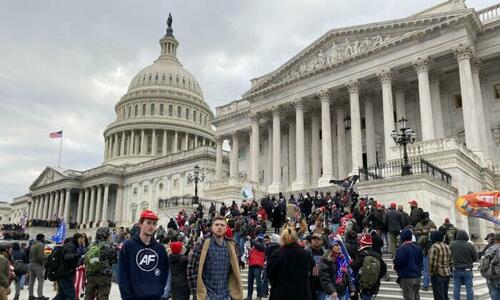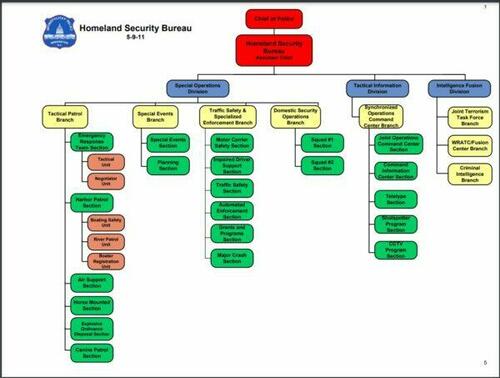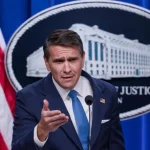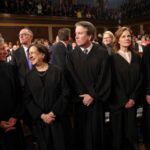
Authored by Patricia Tolson via The Epoch Times (emphasis ours),
As previously reported in an exclusive June 20 report, evidence proves that “plainclothes” members of a special Electronic Surveillance Unit (ESU) were embedded among Jan. 6, 2021, protesters for the purposes of conducting video surveillance. According to experts, one believes the activity itself may have been against the law. The other contends it was done for the purpose of entrapment.

Against the Law?
Speaking as a former prosecutor and three-term District Judge, Rep. Louie Gohmert (R-Texas) told The Epoch Times, “if you’re going to have electronic surveillance of people there has to be warrants.”
As Gohmert explained, “FISA courts have granted warrants,” with “no particular clarity” and “no probable cause that a crime’s been committed or that this person engaged in a crime.”
The Foreign Intelligence Surveillance Court (FISC) was established under the 1978 Foreign Intelligence Surveillance Act (FISA). “Pursuant to FISA,” the FISC website explains, “the Court entertains applications submitted by the United States Government for approval of electronic surveillance, physical search, and other investigative actions for foreign intelligence purposes.”
Regarding domestic electronic surveillance, the Department of Justice (DOJ) website, “Because of the well-recognized intrusive nature of many types of electronic surveillance, especially wiretaps and ‘bugs,’ and the Fourth Amendment implications of the government’s use of these devices in the course of its investigations, the relevant statutes (and related Department of Justice guidelines) provide restrictions on the use of most electronic surveillance, including the requirement that a high-level Department official specifically approve the use of many of these types of electronic surveillance prior to an Assistant United States Attorney obtaining a court order authorizing interception.”
Furthermore, “when court authorization for video surveillance is deemed necessary, it should be obtained by way of an application and order predicated on Fed. R. Crim. P. 41(b) and the All Writs Act (28 U.S.C. § 1651). The application and order should be based on an affidavit that establishes probable cause to believe that evidence of a Federal crime will be obtained by the surveillance. In addition, the affidavit should comply with certain provisions of the Federal electronic surveillance statutes.”
Gohmert surmised: “When you see confirmed judges are just willing to completely abrogate the U.S. Constitution because they’re the star chamber of the secret court, and they figure nobody will ever find out what they’re doing, then you know when you see there’s an Electronic Surveillance Unit, well, something’s not right.”
Gohmert’s concerns with the ESU surveillance are two-fold:
-
Were the legally required warrants obtained?
-
If so, how could a judge approve a warrant for surveillance before a crime has been committed and with no probable cause?
“We can’t have secret units doing secret surveillance of people that have committed no crime, no probable cause of a crime. Just getting blanket surveillance,” Gohmert asserted. “We don’t know what kind of warrant they had or even if they had warrants. But to deploy Electronic Surveillance Units tells us there’s a lot more here that we need to find out about and obviously it’s not going to be uncovered at least for another six months.”
But Gohmert added that “there is also more information we haven’t gotten and information that continues to leak out drip by drip.”
“Like this in [article] The Epoch Times,” Gohmert noted, “pointing out how until the deployment of munitions, the crowd was peaceful. I had heard from people and seen people interviewed saying there wasn’t any violence out there. ‘We were just mulling around, chanting stuff from time to time, then they started firing on us with tear gas and provoked the crowd.’ They created chaos, and you just wonder what was going on.”
The Evidence
Evidence of the embedded ESU members was discovered in a Jan. 3, 2021, First Amendment Demonstrations report, issued by Chief of Police Robert Contee of the Metropolitan Police Department (MPD), Homeland Security Bureau, Special Operations Division, obtained exclusively by The Epoch Times. While it is unclear who the MPD ESU “members” were, the report stated they wore a specific “bracelet on their left wrist identifying them as MPD personnel” among the protesters. Of the 37 “Specialized Units” listed as part of the MPD, an ESU is not among them.
Also in the report, revealed now for the first time, was the advisory that the Special Operations Division “will have personnel to assist with this detail and will assist with any demonstration.” Among them were Domestic Security Officers, or DSOs.

The Special Operations Division is part of the United States Secret Service, which is part of Homeland Security.
Under the heading of “Special Operations Division — Deployment Requirements,” the report said “the Incident Commander” shall ensure that specific objectives were “adhered to.” Among those is the order that “Long Range Acoustical Device (LRAD) – The LRAD along with the warning sheets shall be deployed by the DSO members along with the munitions load out and arrest kits.”
Domestic Security Officers (pdf) are also part of Homeland Security’s Special Operations Division.

According to The Focus, the DSO “can be heard shouted on audio recordings of the Capitol siege, when law enforcement officers needed additional support against the oncoming masses.”
“DSOs are primarily used as riot police, to dole out such crowd control measures as tear gas, pepper spray, batons and rubber bullets intended to disperse rioters. Their weapons can be lethal and are only to be used in the most extreme circumstances.”
Video evidence shows an unidentified individual handing weapons to people through a window from inside the Capitol building.
Joseph McBride, an attorney for multiple January 6 prisoners and defendants identified a man tagged by “Sedition Hunters” as “Red-Faced 45.” The man McBride says is “clearly law enforcement,” was dressed in red from head to toe—with even his face painted red. He appears in a video engaging in continuous dialogue with others whom McBride also insists are agents embedded in the crowd.
“He passes out weapons, sledgehammers, poles, mace. Some of those things come in contact with some of the other protesters who have subsequently been charged with possessing dangerous weapons and are using dangerous weapons at the Capitol. That is clearly entrapment.
That is clearly the government creating conditions of dangerousness and entrapping members of the crowd to possess weapons and possibly use them for reasons that we cannot comprehend.”
According to a 140-page report issued by then-Capitol Police Inspector General Michael Bolton—”Review of the Events Surrounding the Jan. 6, 2021, Takeover of the U.S. Capitol”—Capitol Police’s Civil Disturbance Unit was ordered by supervisors not to use the department’s most powerful tools, like stun guns. Also, “heavier, less-lethal weapons,” including stun grenades, “were not used that day because of orders from leadership.”
Read more here...
Authored by Patricia Tolson via The Epoch Times (emphasis ours),
As previously reported in an exclusive June 20 report, evidence proves that “plainclothes” members of a special Electronic Surveillance Unit (ESU) were embedded among Jan. 6, 2021, protesters for the purposes of conducting video surveillance. According to experts, one believes the activity itself may have been against the law. The other contends it was done for the purpose of entrapment.

Against the Law?
Speaking as a former prosecutor and three-term District Judge, Rep. Louie Gohmert (R-Texas) told The Epoch Times, “if you’re going to have electronic surveillance of people there has to be warrants.”
As Gohmert explained, “FISA courts have granted warrants,” with “no particular clarity” and “no probable cause that a crime’s been committed or that this person engaged in a crime.”
The Foreign Intelligence Surveillance Court (FISC) was established under the 1978 Foreign Intelligence Surveillance Act (FISA). “Pursuant to FISA,” the FISC website explains, “the Court entertains applications submitted by the United States Government for approval of electronic surveillance, physical search, and other investigative actions for foreign intelligence purposes.”
Regarding domestic electronic surveillance, the Department of Justice (DOJ) website, “Because of the well-recognized intrusive nature of many types of electronic surveillance, especially wiretaps and ‘bugs,’ and the Fourth Amendment implications of the government’s use of these devices in the course of its investigations, the relevant statutes (and related Department of Justice guidelines) provide restrictions on the use of most electronic surveillance, including the requirement that a high-level Department official specifically approve the use of many of these types of electronic surveillance prior to an Assistant United States Attorney obtaining a court order authorizing interception.”
Furthermore, “when court authorization for video surveillance is deemed necessary, it should be obtained by way of an application and order predicated on Fed. R. Crim. P. 41(b) and the All Writs Act (28 U.S.C. § 1651). The application and order should be based on an affidavit that establishes probable cause to believe that evidence of a Federal crime will be obtained by the surveillance. In addition, the affidavit should comply with certain provisions of the Federal electronic surveillance statutes.”
Gohmert surmised: “When you see confirmed judges are just willing to completely abrogate the U.S. Constitution because they’re the star chamber of the secret court, and they figure nobody will ever find out what they’re doing, then you know when you see there’s an Electronic Surveillance Unit, well, something’s not right.”
Gohmert’s concerns with the ESU surveillance are two-fold:
-
Were the legally required warrants obtained?
-
If so, how could a judge approve a warrant for surveillance before a crime has been committed and with no probable cause?
“We can’t have secret units doing secret surveillance of people that have committed no crime, no probable cause of a crime. Just getting blanket surveillance,” Gohmert asserted. “We don’t know what kind of warrant they had or even if they had warrants. But to deploy Electronic Surveillance Units tells us there’s a lot more here that we need to find out about and obviously it’s not going to be uncovered at least for another six months.”
But Gohmert added that “there is also more information we haven’t gotten and information that continues to leak out drip by drip.”
“Like this in [article] The Epoch Times,” Gohmert noted, “pointing out how until the deployment of munitions, the crowd was peaceful. I had heard from people and seen people interviewed saying there wasn’t any violence out there. ‘We were just mulling around, chanting stuff from time to time, then they started firing on us with tear gas and provoked the crowd.’ They created chaos, and you just wonder what was going on.”
The Evidence
Evidence of the embedded ESU members was discovered in a Jan. 3, 2021, First Amendment Demonstrations report, issued by Chief of Police Robert Contee of the Metropolitan Police Department (MPD), Homeland Security Bureau, Special Operations Division, obtained exclusively by The Epoch Times. While it is unclear who the MPD ESU “members” were, the report stated they wore a specific “bracelet on their left wrist identifying them as MPD personnel” among the protesters. Of the 37 “Specialized Units” listed as part of the MPD, an ESU is not among them.
Also in the report, revealed now for the first time, was the advisory that the Special Operations Division “will have personnel to assist with this detail and will assist with any demonstration.” Among them were Domestic Security Officers, or DSOs.

The Special Operations Division is part of the United States Secret Service, which is part of Homeland Security.
Under the heading of “Special Operations Division — Deployment Requirements,” the report said “the Incident Commander” shall ensure that specific objectives were “adhered to.” Among those is the order that “Long Range Acoustical Device (LRAD) – The LRAD along with the warning sheets shall be deployed by the DSO members along with the munitions load out and arrest kits.”
Domestic Security Officers (pdf) are also part of Homeland Security’s Special Operations Division.

According to The Focus, the DSO “can be heard shouted on audio recordings of the Capitol siege, when law enforcement officers needed additional support against the oncoming masses.”
“DSOs are primarily used as riot police, to dole out such crowd control measures as tear gas, pepper spray, batons and rubber bullets intended to disperse rioters. Their weapons can be lethal and are only to be used in the most extreme circumstances.”
Video evidence shows an unidentified individual handing weapons to people through a window from inside the Capitol building.
Joseph McBride, an attorney for multiple January 6 prisoners and defendants identified a man tagged by “Sedition Hunters” as “Red-Faced 45.” The man McBride says is “clearly law enforcement,” was dressed in red from head to toe—with even his face painted red. He appears in a video engaging in continuous dialogue with others whom McBride also insists are agents embedded in the crowd.
“He passes out weapons, sledgehammers, poles, mace. Some of those things come in contact with some of the other protesters who have subsequently been charged with possessing dangerous weapons and are using dangerous weapons at the Capitol. That is clearly entrapment.
That is clearly the government creating conditions of dangerousness and entrapping members of the crowd to possess weapons and possibly use them for reasons that we cannot comprehend.”
According to a 140-page report issued by then-Capitol Police Inspector General Michael Bolton—”Review of the Events Surrounding the Jan. 6, 2021, Takeover of the U.S. Capitol”—Capitol Police’s Civil Disturbance Unit was ordered by supervisors not to use the department’s most powerful tools, like stun guns. Also, “heavier, less-lethal weapons,” including stun grenades, “were not used that day because of orders from leadership.”
Read more here…







